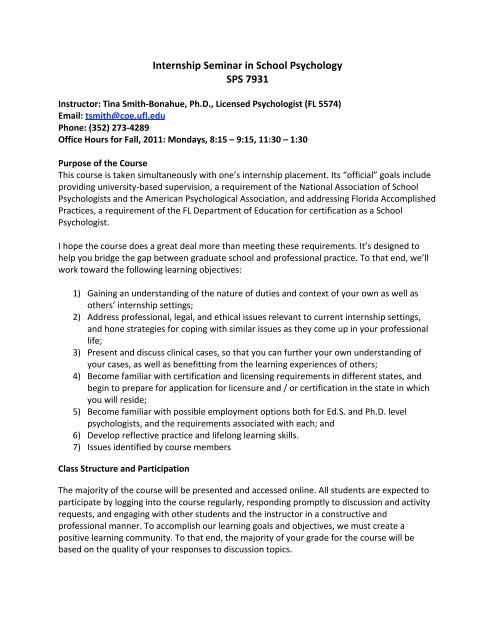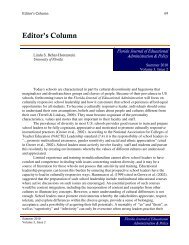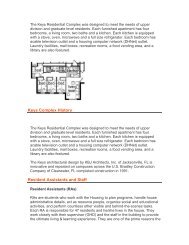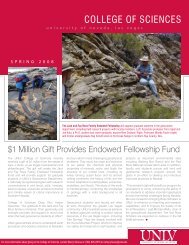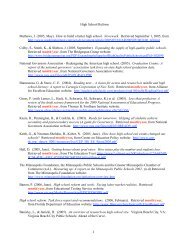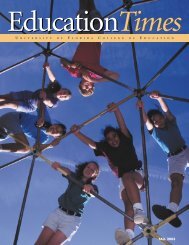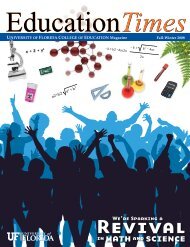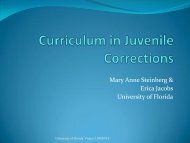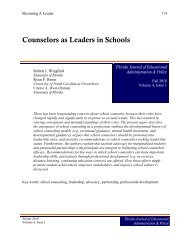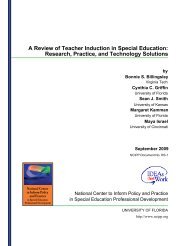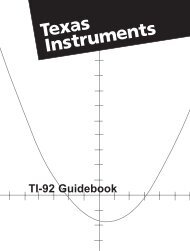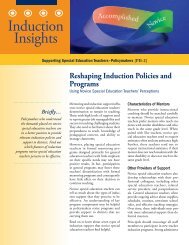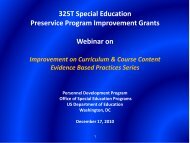Internship Seminar in School Psychology SPS 7931 - Educator ...
Internship Seminar in School Psychology SPS 7931 - Educator ...
Internship Seminar in School Psychology SPS 7931 - Educator ...
You also want an ePaper? Increase the reach of your titles
YUMPU automatically turns print PDFs into web optimized ePapers that Google loves.
<strong>Internship</strong> <strong>Sem<strong>in</strong>ar</strong> <strong>in</strong> <strong>School</strong> <strong>Psychology</strong><br />
<strong>SPS</strong> <strong>7931</strong><br />
Instructor: T<strong>in</strong>a Smith‐Bonahue, Ph.D., Licensed Psychologist (FL 5574)<br />
Email: tsmith@coe.ufl.edu<br />
Phone: (352) 273‐4289<br />
Office Hours for Fall, 2011: Mondays, 8:15 – 9:15, 11:30 – 1:30<br />
Purpose of the Course<br />
This course is taken simultaneously with one’s <strong>in</strong>ternship placement. Its “official” goals <strong>in</strong>clude<br />
provid<strong>in</strong>g university‐based supervision, a requirement of the National Association of <strong>School</strong><br />
Psychologists and the American Psychological Association, and address<strong>in</strong>g Florida Accomplished<br />
Practices, a requirement of the FL Department of Education for certification as a <strong>School</strong><br />
Psychologist.<br />
I hope the course does a great deal more than meet<strong>in</strong>g these requirements. It’s designed to<br />
help you bridge the gap between graduate school and professional practice. To that end, we’ll<br />
work toward the follow<strong>in</strong>g learn<strong>in</strong>g objectives:<br />
1) Ga<strong>in</strong><strong>in</strong>g an understand<strong>in</strong>g of the nature of duties and context of your own as well as<br />
others’ <strong>in</strong>ternship sett<strong>in</strong>gs;<br />
2) Address professional, legal, and ethical issues relevant to current <strong>in</strong>ternship sett<strong>in</strong>gs,<br />
and hone strategies for cop<strong>in</strong>g with similar issues as they come up <strong>in</strong> your professional<br />
life;<br />
3) Present and discuss cl<strong>in</strong>ical cases, so that you can further your own understand<strong>in</strong>g of<br />
your cases, as well as benefitt<strong>in</strong>g from the learn<strong>in</strong>g experiences of others;<br />
4) Become familiar with certification and licens<strong>in</strong>g requirements <strong>in</strong> different states, and<br />
beg<strong>in</strong> to prepare for application for licensure and / or certification <strong>in</strong> the state <strong>in</strong> which<br />
you will reside;<br />
5) Become familiar with possible employment options both for Ed.S. and Ph.D. level<br />
psychologists, and the requirements associated with each; and<br />
6) Develop reflective practice and lifelong learn<strong>in</strong>g skills.<br />
7) Issues identified by course members<br />
Class Structure and Participation<br />
The majority of the course will be presented and accessed onl<strong>in</strong>e. All students are expected to<br />
participate by logg<strong>in</strong>g <strong>in</strong>to the course regularly, respond<strong>in</strong>g promptly to discussion and activity<br />
requests, and engag<strong>in</strong>g with other students and the <strong>in</strong>structor <strong>in</strong> a constructive and<br />
professional manner. To accomplish our learn<strong>in</strong>g goals and objectives, we must create a<br />
positive learn<strong>in</strong>g community. To that end, the majority of your grade for the course will be<br />
based on the quality of your responses to discussion topics.
As a learn<strong>in</strong>g community, the success of this course depends on the extent to which we learn<br />
from each other. For this class, these discussions will be the primary way <strong>in</strong> which we share and<br />
learn from one another – therefore, this is a critical part of the course. For us to be a learn<strong>in</strong>g<br />
community, we have to engage <strong>in</strong> exploration of our field together, at roughly the same time.<br />
This means that, although the topics, read<strong>in</strong>gs, and other resources will be posted <strong>in</strong> advance,<br />
the discussion questions cannot be answered until the Friday before the week <strong>in</strong> which the<br />
topics are assigned.<br />
In addition to the onl<strong>in</strong>e component, EDS students will be required to return campus for 1 fullday<br />
(8:00 – 4:00) meet<strong>in</strong>g per semester. This meet<strong>in</strong>g will be scheduled <strong>in</strong> consultation with<br />
<strong>in</strong>terns and their supervisors; however, please note that it may not be possible to<br />
accommodate all <strong>in</strong>terns’ schedules and preferences. Purposes of the on‐campus meet<strong>in</strong>g<br />
<strong>in</strong>clude the follow<strong>in</strong>g:<br />
1) Provide program faculty with an update on your progress toward completion of<br />
program requirements other than <strong>in</strong>ternship (e.g., Ed.S. portfolios).<br />
2) Provide a support network and opportunity for face‐to‐face group supervision to<br />
address the follow<strong>in</strong>g.<br />
a. Professional issues that have arisen dur<strong>in</strong>g <strong>in</strong>ternship.<br />
b. Discussion of the context and challenges associated with the practice of school<br />
psychology <strong>in</strong> different sett<strong>in</strong>gs.<br />
c. Presentation and discussion of cl<strong>in</strong>ical cases.<br />
Because EDS. students complete their portfolios dur<strong>in</strong>g the <strong>in</strong>ternship year, and because the<br />
nature of the EDS <strong>in</strong>ternship is such that group supervision of the sort we provide on campus is<br />
extremely rare, the SPP faculty believe that it is important for all EDS students to return to<br />
campus to participate <strong>in</strong> at least one face‐to‐face supervision session per semester.<br />
COURSE ASSIGNMENTS<br />
Weekly Discussion Forum (50%)<br />
Most weeks, you should participate <strong>in</strong> one or more discussion forums. For the first few weeks,<br />
topics and the correspond<strong>in</strong>g read<strong>in</strong>gs and discussion questions will be posed by myself and<br />
other faculty. Later <strong>in</strong> the semester, each of you will have a turn to identify a topic of <strong>in</strong>terest<br />
and lead the discussion. (More on this under the assignment, “Discussion Leader.”) Similarly,<br />
each person will present a case they’re work<strong>in</strong>g on. (More on this under Case Presentation.)<br />
Each student will be responsible for present<strong>in</strong>g both a topic and a case over the course of the<br />
Fall and Spr<strong>in</strong>g Semesters. Please see the sign‐up sheet under “Gett<strong>in</strong>g Started.”<br />
Your responses to the discussion questions will be graded each week based on the follow<strong>in</strong>g 5<br />
criteria: 1) quality of the <strong>in</strong>formation you provide, 2) the extent and quality of resources (your<br />
own and those from course materials) you reference, 3) evidence of critical th<strong>in</strong>k<strong>in</strong>g, 4) the<br />
extent to which you facilitate the group’s consideration of the issues, and 5) the clarity of your
written response. These are generally described below. (Please see Rubric for Discussion for<br />
specific <strong>in</strong>formation about how these posts will be graded.) For each forum, you can earn up to<br />
100 po<strong>in</strong>ts for your participation <strong>in</strong> the discussion. For our purposes, Weeks run from Monday<br />
to Monday. With the exception of Week 1: Gett<strong>in</strong>g to Know You (Aga<strong>in</strong>) (which opens on the<br />
first day of class and closes the follow<strong>in</strong>g Monday), materials will become available and<br />
discussions will “open” on the Friday prior, and “close” at midnight the follow<strong>in</strong>g Sunday. (I<br />
know this is confus<strong>in</strong>g – it’s outl<strong>in</strong>ed on the Course Calendar and makes more sense when you<br />
see it that way.) Your first post must be made by midnight the Thursday of the week for which<br />
the topic is assigned. I hope you’ll make more posts than one, but if you don’t post at least one<br />
response by Thursday, I will not be able to grade your discussion for that week. In assign<strong>in</strong>g a<br />
grade, I’ll consider all posts that you make before Sunday at midnight; posts made after that<br />
will not be graded.<br />
I’ll drop the lowest grade for Discussion Participation<br />
Grad<strong>in</strong>g Criteria for Discussion Questions<br />
Quality of Information<br />
For this, I’m look<strong>in</strong>g for the extent to which you address the topic of discussion <strong>in</strong> a mean<strong>in</strong>gful<br />
way. The question I’ll ask myself is, “Does this responder engage with the topic at hand, or go<br />
off on a tangent?” For some units, discussions are based on an experiential component – that<br />
is, you’ll be asked to “do someth<strong>in</strong>g” and react to the outcome. In these cases, it’ll be important<br />
to clearly describe your experience with the activity as part of your post.<br />
Quality of Resources Referenced<br />
In order for this to be a mean<strong>in</strong>gful class that <strong>in</strong>fluences your practice, I consider your personal<br />
and professional experiences to be a k<strong>in</strong>d of “resource” – you have important ideas based on<br />
your own work to share with the group. So I want to hear about your own professional<br />
experience, both <strong>in</strong> terms of experiences you’ve already had and ways new <strong>in</strong>formation can<br />
shape your future practice. It’s also important to <strong>in</strong>clude references to read<strong>in</strong>g and other<br />
course materials – <strong>in</strong> an academic endeavor, it’s critical to support our views with scholarly<br />
<strong>in</strong>formation.<br />
Evidence of Critical Th<strong>in</strong>k<strong>in</strong>g<br />
Discussions are designed to push you to th<strong>in</strong>k critically, <strong>in</strong> a new and more sophisticated way,<br />
about issues related to assessment and measurement <strong>in</strong> early childhood. In this section, I’ll be<br />
look<strong>in</strong>g for evidence of thoughtful reflection, and the big question I’ll ask myself <strong>in</strong> mak<strong>in</strong>g<br />
these evaluations is, “To what extent did the responder th<strong>in</strong>k for her‐ or himself about his topic,<br />
and to what extent is s/he merely parrot<strong>in</strong>g the book or classmates?”<br />
Group Facilitation<br />
“Discuss<strong>in</strong>g” is <strong>in</strong>teraction, and <strong>in</strong>volves respond<strong>in</strong>g to the comments of others, help<strong>in</strong>g other<br />
learners, ask<strong>in</strong>g provocative questions, be<strong>in</strong>g <strong>in</strong>volved and debat<strong>in</strong>g. It’s important to connect<br />
your responses both to the question posed by the facilitator, as well as the comments of those<br />
who’ve already responded. Ask yourself the follow<strong>in</strong>g: “Do I tend to respond first? Do I always
espond last?” Everyone can’t be a “first responder,” but no one should always be the “last<br />
responder.” If you do respond first, do you state your views and then drop out of the<br />
discussion? It’s important to “hear” what your classmates have to say – each member of the<br />
class is an important “resource” <strong>in</strong> our community of learners.<br />
Writ<strong>in</strong>g Clarity<br />
No matter how <strong>in</strong>terest<strong>in</strong>g, well‐<strong>in</strong>formed, or <strong>in</strong>novative your ideas, if they’re not expressed<br />
clearly, us<strong>in</strong>g professional language, we won’t be able to fully appreciate what you have to<br />
offer. Please edit your response before post<strong>in</strong>g to make sure it conveys what you mean and<br />
reflects an amount of professionalism appropriate to a class <strong>in</strong> a graduate program.<br />
Discussion Leader (20%): Either Topic or Case (Remember: Whichever you don’t choose this<br />
semester you have to choose next semester)<br />
Topic Leader<br />
Step 1: Identify a topic of <strong>in</strong>terest that is pert<strong>in</strong>ent to you <strong>in</strong> your current work and get it<br />
approved by the <strong>in</strong>structor. Topics can <strong>in</strong>clude current events related to the practice of school<br />
psychology, special populations (e.g., early childhood, children with low <strong>in</strong>cidence disabilities,<br />
ADHD), ethical or legal dilemmas, service provision models (e.g., RtI implementation,<br />
implications of managed care for mental health services), etc. Please note that topics must be<br />
approved by the <strong>in</strong>structor. Topic discussions can be facilitated <strong>in</strong>dividually or with a partner.<br />
Cases are presented <strong>in</strong>dividually.<br />
Step 2: Identify a read<strong>in</strong>g to share with the class. In keep<strong>in</strong>g with Course Policies, all read<strong>in</strong>gs<br />
should be made available to student no later than the Friday prior to week dur<strong>in</strong>g which it will<br />
be considered and discussed.<br />
Step 3: Post at least 2 questions for consideration to get the Discussion Forum started. As<br />
discussion leader, you’re also responsible for facilitat<strong>in</strong>g the discussion, so you should plan to<br />
log <strong>in</strong> every day or so dur<strong>in</strong>g the week you’re lead<strong>in</strong>g the discussion.<br />
(Please see Discussion Rubric under “Gett<strong>in</strong>g Started.”)<br />
Case Presentations:<br />
BOTH EdS and PhD cases should <strong>in</strong>clude the follow<strong>in</strong>g sections: Reason for Referral,<br />
Background, Procedures Used (for assessment cases, list all <strong>in</strong>struments and techniques used;<br />
for <strong>in</strong>tervention and consultation, describe the approach <strong>in</strong> enough detail that the reader could<br />
replicate), Results (for tests, <strong>in</strong>clude scores and synopsis; for <strong>in</strong>tervention and consultation,<br />
<strong>in</strong>clude brief session notes); Summary and Recommendations.<br />
Ph.D. students will present their cases onl<strong>in</strong>e. A report, with all HIPPA‐protected <strong>in</strong>formation<br />
removed, should be provided. The presenter should also provide at least one scholarly article<br />
that addresses the issues <strong>in</strong> the case. The presenter will also develop 2‐3 discussion questions<br />
for the class to consider.
EdS. students will present their cases dur<strong>in</strong>g the on‐campus meet<strong>in</strong>g. Each presentation should<br />
last approximately 20 m<strong>in</strong>utes and <strong>in</strong>clude a powerpo<strong>in</strong>t presentation. Presenters should<br />
prepare 2‐3 discussion questions for the group.<br />
Organizational Overview: <strong>School</strong> <strong>Psychology</strong> Service Delivery System Revisited (10%)<br />
For this assignment, th<strong>in</strong>k back to one of the first courses you took <strong>in</strong> the SPP, <strong>SPS</strong> 6052: Issues<br />
and Problems <strong>in</strong> <strong>School</strong> <strong>Psychology</strong>. In that class, you either described a service delivery system<br />
or created an ideal one. We’re go<strong>in</strong>g to replicate that assignment, with a few modifications,<br />
us<strong>in</strong>g the program <strong>in</strong> which you’re <strong>in</strong>tern<strong>in</strong>g.<br />
One very <strong>in</strong>terest<strong>in</strong>g change between then and now it that for this assignment, you’re actually<br />
work<strong>in</strong>g for the agency, district, or program you’re describ<strong>in</strong>g. The old say<strong>in</strong>g about “bit<strong>in</strong>g the<br />
hand” comes to m<strong>in</strong>d… Your project should be descriptive but diplomatic and NOT evaluative.<br />
This is particularly important given the next change s<strong>in</strong>ce <strong>SPS</strong> 6052.<br />
You’ll be shar<strong>in</strong>g your projects with each other as well as first year students who are tak<strong>in</strong>g <strong>SPS</strong><br />
6052. The goal of this assignment is to help you all discover different k<strong>in</strong>ds of sett<strong>in</strong>gs that<br />
employ school psychologists as you beg<strong>in</strong> to, or cont<strong>in</strong>ue to, consider the types of jobs you’ll<br />
seek when you f<strong>in</strong>ish up. You’ll have the opportunity to ask each other questions, and the<br />
students <strong>in</strong> 6052 will be <strong>in</strong>vited to ask you questions as well. In the spirit of a professional<br />
learn<strong>in</strong>g community, I hope this will provide an opportunity for mentor<strong>in</strong>g on your part as well<br />
as resource shar<strong>in</strong>g.<br />
Your project should <strong>in</strong>clude the follow<strong>in</strong>g <strong>in</strong>formation:<br />
1. Introductory Information<br />
a. Name of program<br />
b. What name best describes the type of agency (e.g., <strong>in</strong>dependent school district,<br />
consortium, public hospital, etc.)<br />
2. Needs Assessment (The next couple sections will probably look familiar!)<br />
a. Describe the physical (region, climate, rural, urban, etc.) and sociological (SES,<br />
dist<strong>in</strong>ctive racial or ethnic groups, political lean<strong>in</strong>g, etc.) of the area, as well as<br />
other noteworthy characteristics (e.g., high <strong>in</strong>stances of unemployment, crime,<br />
drug use)<br />
b. For <strong>School</strong> Districts: Describe the number and types of school and estimate the<br />
number of children per school. For other agencies: How large is the organization<br />
<strong>in</strong> terms of employees and clients served? Is it part of a larger organization or<br />
stand alone?<br />
c. Describe the current psychological service delivery system <strong>in</strong> terms of<br />
“demographics” <strong>in</strong>clud<strong>in</strong>g number of psychologists, ratio of psychologist to<br />
client. To what extent do the demographic characteristics of the psychologists<br />
match the clients? For example, do they tend to live <strong>in</strong> the same k<strong>in</strong>ds of<br />
neighborhoods, speak the same language, etc.?
d. Describe the psychological and educational needs of the children your agency<br />
serves. What sorts of referral questions are most common among your clients?<br />
Does your agency purport to have a specialization? Is it known for excellence <strong>in</strong><br />
any areas?<br />
3. Service Delivery<br />
a. Describe all the types of psychological services provided by your agency. If you’re<br />
not <strong>in</strong> a traditional school district, what other services are provided by your<br />
agency?<br />
b. What percentage of time do psychologists typically spend <strong>in</strong> each type of<br />
service? Among the psychologists employed by your agency, are there specialists<br />
(e.g., neuropsychologists, crisis specialists, low <strong>in</strong>cidence disabilities, etc.), or do<br />
all psychologists perform the same functions?<br />
c. What qualifications are necessary to work as a psychologist <strong>in</strong> the agency? For<br />
example, what level (EdS, PhD, PsyD) and type of degrees do psychologists hold?<br />
Is extra tra<strong>in</strong><strong>in</strong>g or specialization required for some or all of the psychologists?<br />
What types of ongo<strong>in</strong>g professional development (e.g., coursework, attend<strong>in</strong>g<br />
conferences, district‐sponsored workshops, etc.) do psychologists <strong>in</strong> your agency<br />
participate <strong>in</strong>?<br />
d. How would you describe the service delivery model employed by your agency?<br />
(See ___ .) Why did you choose the model you chose? In what ways does your<br />
agency deviate from the way the model is typically implemented?<br />
e. Provide an organizational chart show<strong>in</strong>g where psychological services appear <strong>in</strong><br />
the overall structure of the organization or district.<br />
4. Accountability and Evaluation<br />
a. List your agency’s primary stakeholders. Be <strong>in</strong>clusive, and consider, literally, all<br />
the people who have a stake <strong>in</strong> the services provided by your agency. It may be a<br />
long list, and it likely <strong>in</strong>cludes people with different k<strong>in</strong>ds of stakes <strong>in</strong> your<br />
agency. For example, families are almost certa<strong>in</strong>ly one stakeholder, also whoever<br />
pays the bills (e.g., taxpayers, <strong>in</strong>surance companies).<br />
b. What “products” does your agency provide? By products, I mean someth<strong>in</strong>g that<br />
can be counted, although they’re not always tangible. Th<strong>in</strong>k broadly – they might<br />
<strong>in</strong>clude reports, billable hours, eligibility determ<strong>in</strong>ations, etc. How are these<br />
th<strong>in</strong>gs used <strong>in</strong> the evaluation of your agency?<br />
c. There is a strong movement <strong>in</strong> education to demonstrate the impact of every<br />
employee on student outcome. Th<strong>in</strong>k about the types of services provided by<br />
your agency. How does the agency determ<strong>in</strong>e if the services you provide have an<br />
impact on client outcome?<br />
Grad<strong>in</strong>g for Organizational Overview<br />
Project<br />
Each section of your project will be graded based on the thoroughness and the quality of<br />
the <strong>in</strong>formation shared. In consider<strong>in</strong>g quality, I’ll take <strong>in</strong>to account the extent to which
your descriptions are reflective, objective, and fair. (Remember, it’s really important to be<br />
descriptive and detailed without be<strong>in</strong>g evaluative.)<br />
Participation and Facilitation<br />
In addition to complet<strong>in</strong>g the project, you’ll present it to your classmates as well as 6052<br />
students. You’ll be graded on the quality of your participation and facilitation for this<br />
project us<strong>in</strong>g the same rubric we use <strong>in</strong> grad<strong>in</strong>g Discussion participation.<br />
Journal of Your Professional Journey (20%)<br />
This assignment is designed to encourage you to reflect on your own professional development.<br />
Journal entries will vary <strong>in</strong> length over the course of the year (I have <strong>in</strong> m<strong>in</strong>d an average of<br />
around 150 words) and most can <strong>in</strong>clude anyth<strong>in</strong>g that’s on your m<strong>in</strong>d that relates to your own<br />
professional development. I’ll read your entries, and sometimes may comment on them, but<br />
these entries will rema<strong>in</strong> confidential between the two of us to the extent allowed by law.<br />
Although the topic of almost all of your entries is your choice, <strong>in</strong> the first entry, please <strong>in</strong>clude<br />
<strong>in</strong>formation about your goals for <strong>in</strong>ternship, areas <strong>in</strong> which you’re confident, and areas <strong>in</strong> which<br />
you feel less well‐prepared. Of course, your first entry can <strong>in</strong>clude anyth<strong>in</strong>g else you’d like to<br />
<strong>in</strong>clude as well. Similarly, your last entry for the semester should revisit your first and address<br />
the extent to which you feel you’re reach<strong>in</strong>g your goals. If you’re not reach<strong>in</strong>g your goals,<br />
what’s stand<strong>in</strong>g <strong>in</strong> the way?<br />
Grades<br />
Course grades are S / U. > 80% of total po<strong>in</strong>ts is required for S.<br />
Accommodations for Students with Disabilities:<br />
Students with disabilities are encouraged to <strong>in</strong>form the <strong>in</strong>structor of accommodation needs. To<br />
acquire accommodations for practicum sem<strong>in</strong>ar and/or field placement site work register with<br />
the Dean of Students Office. The Dean of Students Office will provide documentation to give to<br />
the Instructor with recommended accommodations. Additional <strong>in</strong>formation on disability<br />
services at UF and student rights are available at: (352) 392‐8565, accessuf@dso.ufl.edu,<br />
http://www.dso.ufl.edu/drc<br />
Policy Concern<strong>in</strong>g Honesty<br />
As a result of complet<strong>in</strong>g the registration form at the University of Florida, every student has<br />
signed the follow<strong>in</strong>g statement: "I understand that the University of Florida expects its students<br />
to be honest <strong>in</strong> all their academic work. I agree to adhere to this commitment to academic<br />
honesty and understand that my failure to comply with this commitment may result <strong>in</strong><br />
discipl<strong>in</strong>ary action up to and <strong>in</strong>clud<strong>in</strong>g expulsion from the University” (Student Handbook).<br />
Evaluation Based On Florida Accomplished Practices.<br />
The State of Florida has established an <strong>Educator</strong> Assessment System. It requires of all entrylevel<br />
educators, <strong>in</strong>clud<strong>in</strong>g school psychologists, to master the knowledge, skills and dispositions<br />
of twelve accomplished practices <strong>in</strong>tended to promote the development of qualities considered
to be essential <strong>in</strong> the preparation of professionals who work <strong>in</strong> schools. Each professional<br />
program must document that its students demonstrate desired qualities. As a result, course<br />
syllabi must <strong>in</strong>clude an (1) overview of the <strong>Educator</strong> Assessment System and accomplished<br />
practices, (2) specific accomplished practices addressed <strong>in</strong> the course, (3) specific <strong>Educator</strong><br />
Assessment System <strong>in</strong>dicators addressed <strong>in</strong> course, (4) description of assessment tasks used to<br />
evaluate accomplished practices/<strong>in</strong>dicators, and (5) a rat<strong>in</strong>g guide for each assessment task and<br />
<strong>in</strong>dicator.<br />
Because it accompanies a capstone experience for our program, this course <strong>in</strong>cludes a number<br />
of the Florida Accomplished Practices (described below) and is designed to ensure that you<br />
have an opportunity to atta<strong>in</strong> a level of proficiency appropriate to a beg<strong>in</strong>n<strong>in</strong>g school<br />
psychologist. Many of the assignments also are connected to the portfolio. Over the course of<br />
the Fall and Spr<strong>in</strong>g semesters, I will be attend<strong>in</strong>g to these practices. Students will be rated on<br />
each task/<strong>in</strong>dicator as either hav<strong>in</strong>g met, met with weakness, or not met each <strong>in</strong>dicator. If rated<br />
as met with weakness or not met, remediation plans must be specified for the student.<br />
Program faculty will discuss student rat<strong>in</strong>gs on the assessment tasks for each course the end of<br />
each academic year dur<strong>in</strong>g the annual review of student progress. The <strong>in</strong>structor will enter all<br />
student rat<strong>in</strong>gs <strong>in</strong>to the <strong>Educator</strong> Assessment System each May.<br />
Your mastery of each <strong>in</strong>dicator will be measured by your work on a key task. To pass this course<br />
you must successfully complete all these tasks and receive a rat<strong>in</strong>g of either met, or met with<br />
weakness. No exceptions will be made to this policy.<br />
Students who receive a not‐met rat<strong>in</strong>g will be offered an opportunity to redo the key tasks.<br />
Students who do not complete their makeup work satisfactorily (with a met‐with‐weakness or<br />
higher rat<strong>in</strong>g) will receive either an <strong>in</strong>complete or a fail<strong>in</strong>g grade at the discretion of the<br />
<strong>in</strong>structor.<br />
Accomplished Practices Addressed <strong>in</strong> <strong>SPS</strong> <strong>7931</strong><br />
(1) Assessment: The preprofessional student services specialist collects and uses data gathered<br />
from a variety of sources, <strong>in</strong>clud<strong>in</strong>g the use of both traditional and non‐traditional assessment<br />
strategies. Further, this specialist is able to identify and match the service plan(s) for the<br />
student(s) with the students’ cognitive, social, l<strong>in</strong>guistic, cultural, emotional, and physical<br />
needs.<br />
(4) Critical Th<strong>in</strong>k<strong>in</strong>g: The preprofessional student services specialist acquires use of assessment<br />
techniques and strategies that measure cognitive skills and affective characteristics <strong>in</strong> students<br />
and builds a repertoire of realistic student service(s) delivery techniques and problem‐solv<strong>in</strong>g<br />
activities designed to assist all students to demonstrate appropriate levels of academic<br />
performance.<br />
(5) Diversity: The preprofessional student services specialist establishes a comfortable<br />
environment that accepts and fosters diversity. This specialist must demonstrate knowledge<br />
and awareness of varied cultures and l<strong>in</strong>guistic backgrounds. The student services specialist<br />
creates a climate of openness, <strong>in</strong>quiry, and support by practic<strong>in</strong>g such strategies as acceptance,<br />
tolerance, resolution, and mediation.
(7) Human Development and Learn<strong>in</strong>g: The preprofessional student services specialist plans<br />
student service(s) activities that draw upon well‐established human development/<br />
learn<strong>in</strong>g theories and concepts and a variety of <strong>in</strong>formation about students.<br />
(8) Knowledge of Subject Matter: The preprofessional student services specialist has a basic<br />
understand<strong>in</strong>g of a particular student service profession and is beg<strong>in</strong>n<strong>in</strong>g to understand how<br />
student services are l<strong>in</strong>ked to other discipl<strong>in</strong>es and activities <strong>in</strong> the school. The student services<br />
specialist’s repertoire of professional skills <strong>in</strong>cludes a variety of means to assist students’<br />
development, learn<strong>in</strong>g, and/or behavior change.<br />
(10) Plann<strong>in</strong>g: The preprofessional student services specialist recognizes the importance of<br />
sett<strong>in</strong>g high expectations for all students, and works with other professionals to design learn<strong>in</strong>g<br />
experiences that meet students' needs and <strong>in</strong>terests. The student services specialist candidate<br />
seeks advice, <strong>in</strong>formation, and/or feedback from appropriate resources, <strong>in</strong>terprets the<br />
<strong>in</strong>formation, and modifies her/his plans appropriately. Planned student service(s) activities<br />
<strong>in</strong>corporate a creative environment and utilize varied and motivational strategies and multiple<br />
resources for provid<strong>in</strong>g effective student service(s) for all students. Upon reflection, the student<br />
services specialist cont<strong>in</strong>uously ref<strong>in</strong>es outcome assessment and student services activities and<br />
experiences.<br />
Key Task/Assignment #1: Portfolio Assessment Case and Reflection Paper<br />
The purpose of the assessment case study is to demonstrate that school psychology candidates<br />
possess the knowledge and professional skills needed to collaborate with teachers, school<br />
professionals, and families <strong>in</strong> design<strong>in</strong>g, complet<strong>in</strong>g, and report<strong>in</strong>g comprehensive assessments<br />
that respond effectively to the educational and mental health needs of children and youth.<br />
The comprehensive assessment must respond appropriately to an identified referral question,<br />
illustrate use of reliable and valid assessment <strong>in</strong>struments and techniques, demonstrate an<br />
ability to <strong>in</strong>tegrate assessment data and other student and family <strong>in</strong>formation for the purposes<br />
of identify<strong>in</strong>g student needs, and <strong>in</strong>form the provision of appropriate educational services and<br />
<strong>in</strong>terventions.<br />
Case studies <strong>in</strong>cluded <strong>in</strong> the school psychology professional portfolio represent comprehensive<br />
assessments that address an academic and/or behavioral concern that significantly impacts a<br />
student’s educational performance and/or progress.<br />
Psychological reports should:<br />
•<br />
List assessment procedures used that are appropriate to the referral concern<br />
•<br />
State the reason for the referral<br />
•<br />
Provide student background <strong>in</strong>formation<br />
•<br />
Present and discuss assessment data<br />
•
Provide educational recommendations that <strong>in</strong>form the selection of <strong>in</strong>terventions and other<br />
educational services<br />
The Portfolio also must <strong>in</strong>clude a reflection paper for each assessment case study. The purpose<br />
of each paper is to consider the comprehensiveness of the evaluation and the actions and<br />
decisions made dur<strong>in</strong>g the assessment process. The papers should demonstrate an<br />
understand<strong>in</strong>g of a theoretical orientation and reliance on empirically based research and other<br />
forms of professional scholarship. Additionally, each candidate should demonstrate an ability to<br />
critique his or her own professional decisions and practices and thus demonstrate cont<strong>in</strong>u<strong>in</strong>g<br />
professional growth and development.<br />
Each assessment case study <strong>in</strong>cluded <strong>in</strong> the portfolio must address the follow<strong>in</strong>g issues and<br />
questions <strong>in</strong> the reflection paper.<br />
1.<br />
Based on the referral question, describe the purpose of this evaluation (diagnosis, program<br />
plann<strong>in</strong>g, <strong>in</strong>tervention development, eligibility determ<strong>in</strong>ation).<br />
2.<br />
Describe how the referral question guided the assessment process.<br />
3.<br />
Discuss the extent to which the techniques selected adequately address the referral question<br />
and child’s needs.<br />
4.<br />
Discuss what you would do differently <strong>in</strong> terms of selection of techniques.<br />
5.<br />
Discuss any legal and/or ethical considerations that may have <strong>in</strong>fluenced the selection of<br />
measures and other techniques used <strong>in</strong> the evaluation (e.g. issues related to special education<br />
services and supports and/or issues related to the reliability and validity).<br />
6.<br />
Discuss theoretical or empirical bases used <strong>in</strong> the <strong>in</strong>terpretation of f<strong>in</strong>d<strong>in</strong>gs, <strong>in</strong>clud<strong>in</strong>g the extent<br />
to which the conclusions <strong>in</strong> the report supported these bases.<br />
7.<br />
Discuss the l<strong>in</strong>k between assessment and possible <strong>in</strong>terventions, <strong>in</strong>clud<strong>in</strong>g the extent to which<br />
this report provide evidence for the development and evaluation of <strong>in</strong>tervention strategies. If<br />
you f<strong>in</strong>d the report <strong>in</strong>adequate <strong>in</strong> this regard, describe how you would change the assessment<br />
process to improve the l<strong>in</strong>k between assessment and <strong>in</strong>tervention.<br />
<strong>SPS</strong> <strong>7931</strong> Page 5<br />
Indicators and Rat<strong>in</strong>g Guide #1:<br />
Indicator<br />
Number<br />
& Description<br />
MET<br />
MET WITH<br />
WEAKNESS<br />
NOT MET
1.2<br />
Employs a<br />
variety of<br />
assessment<br />
strategies<br />
congruent with<br />
student<br />
service(s) goals<br />
to determ<strong>in</strong>e<br />
PK‐12 students’<br />
behavior<br />
change.<br />
1.4<br />
Modifies<br />
student<br />
service(s)<br />
strategies<br />
based on<br />
assessed<br />
student<br />
characteristics<br />
and abilities <strong>in</strong><br />
relation to<br />
student’s<br />
needs.<br />
The candidate<br />
employs a variety<br />
of cognitive,<br />
academic, and<br />
social/emotional<br />
assessment<br />
strategies that are<br />
reliable and valid<br />
for their selected<br />
use and consistent<br />
with the student’s<br />
identified referral<br />
concerns.<br />
The candidate<br />
appropriately<br />
modifies the<br />
selection,<br />
adm<strong>in</strong>istration,<br />
and/or<br />
<strong>in</strong>terpretation of<br />
assessment<br />
strategies and<br />
results based on<br />
relevant<br />
<strong>in</strong>formation about<br />
student<br />
characteristics<br />
and educational<br />
or mental health<br />
needs.<br />
The candidate<br />
employs a limited<br />
range of cognitive,<br />
academic, and<br />
social/emotional<br />
assessment<br />
strategies that are<br />
reliable and valid<br />
for their selected<br />
use and generally<br />
consistent with<br />
the presented<br />
referral concerns.<br />
The candidate<br />
demonstrates the<br />
ability to<br />
appropriately<br />
modify some<br />
aspect of the<br />
selection,<br />
adm<strong>in</strong>istration,<br />
and/or<br />
<strong>in</strong>terpretation of<br />
assessment<br />
strategies and<br />
results based on<br />
relevant<br />
<strong>in</strong>formation about<br />
student<br />
characteristics.<br />
The candidate<br />
employs<br />
<strong>in</strong>appropriate<br />
assessment<br />
strategies that<br />
are limited <strong>in</strong><br />
scope, lack<br />
sufficient<br />
reliability and<br />
validity for their<br />
selected use,<br />
and/or are not<br />
consistent with<br />
the presented<br />
referral concerns.<br />
The candidate<br />
fails to<br />
demonstrate an<br />
ability to modify<br />
the selection,<br />
adm<strong>in</strong>istration,<br />
and/or<br />
<strong>in</strong>terpretation of<br />
assessment<br />
strategies and<br />
results. Relevant<br />
<strong>in</strong>formation<br />
about student<br />
characteristics<br />
and educational<br />
or mental health<br />
needs is not<br />
considered <strong>in</strong> the<br />
assessment<br />
process.
<strong>SPS</strong> <strong>7931</strong> Page 6<br />
10.2<br />
Develops<br />
engag<strong>in</strong>g<br />
student<br />
service(s)<br />
activities and<br />
practices that<br />
contribute to<br />
the student’s<br />
achievement of<br />
local, state,<br />
and national<br />
educational<br />
standards.<br />
developmental<br />
level, and result<br />
<strong>in</strong> positive<br />
academic<br />
outcomes.<br />
10.3<br />
Includes multiple<br />
resources and<br />
strategies <strong>in</strong><br />
plann<strong>in</strong>g student<br />
service(s)<br />
practices that<br />
contribute to the<br />
student’s<br />
achievement of<br />
local, state, and<br />
national<br />
educational<br />
standards.<br />
Through the<br />
assessment<br />
process and<br />
recommended<br />
educational<br />
<strong>in</strong>terventions the<br />
candidate<br />
demonstrates an<br />
ability to plan and<br />
implement<br />
activities that<br />
actively engage<br />
students at an<br />
appropriate<br />
level.<br />
When plann<strong>in</strong>g<br />
assessment<br />
strategies and<br />
evaluat<strong>in</strong>g<br />
assessment data<br />
for the purpose<br />
of <strong>in</strong>tervention<br />
plann<strong>in</strong>g, the<br />
candidate<br />
demonstrates<br />
collaboration<br />
with and use of<br />
multiple sources<br />
of data and<br />
resources<br />
provided by<br />
teachers,<br />
parents, and<br />
other<br />
professionals.<br />
Through the<br />
assessment<br />
process and<br />
recommended<br />
educational<br />
<strong>in</strong>terventions the<br />
candidate<br />
demonstrates an<br />
ability to plan and<br />
implement<br />
activities that<br />
engage students<br />
at an appropriate<br />
developmental<br />
When plann<strong>in</strong>g<br />
assessment<br />
strategies and<br />
evaluat<strong>in</strong>g<br />
assessment data<br />
for the purpose<br />
of <strong>in</strong>tervention<br />
plann<strong>in</strong>g, the<br />
candidate<br />
demonstrates<br />
limited<br />
collaboration<br />
with or use of<br />
data and<br />
resources<br />
provided by<br />
teachers,<br />
parents, and<br />
other<br />
professionals.<br />
Through the<br />
assessment<br />
process and<br />
recommended<br />
educational<br />
<strong>in</strong>terventions the<br />
candidate fails to<br />
demonstrate an<br />
ability to plan<br />
and/or<br />
implement<br />
activities that<br />
actively engage<br />
students at an<br />
appropriate<br />
developmental<br />
level and result <strong>in</strong><br />
positive academic<br />
outcomes.<br />
When plann<strong>in</strong>g<br />
assessment<br />
strategies and<br />
evaluat<strong>in</strong>g<br />
assessment data<br />
for the purpose<br />
of <strong>in</strong>tervention<br />
plann<strong>in</strong>g, the<br />
candidate fails to<br />
demonstrate<br />
collaboration<br />
with or use of<br />
data and<br />
resources<br />
provided by<br />
teachers,<br />
parents, and<br />
other<br />
professionals.
7.1<br />
Knows<br />
established<br />
human<br />
development/lea<br />
rn<strong>in</strong>g theories<br />
and concepts<br />
(<strong>in</strong>clud<strong>in</strong>g first<br />
and second<br />
language<br />
acquisition)<br />
The candidate<br />
demonstrates<br />
comprehensive<br />
and accurate<br />
knowledge of<br />
development/lea<br />
rn<strong>in</strong>g theories<br />
and concepts<br />
through analysis<br />
and presentation<br />
of student<br />
educational and<br />
developmental<br />
history and<br />
relationship to<br />
academic<br />
performance.<br />
The candidate<br />
demonstrates<br />
accurate, but<br />
limited<br />
knowledge of<br />
development/lea<br />
rn<strong>in</strong>g theories<br />
and concepts<br />
through analysis<br />
and presentation<br />
of student<br />
educational and<br />
developmental<br />
history and<br />
relationship to<br />
academic<br />
performance.<br />
The candidate<br />
demonstrates<br />
<strong>in</strong>accurate<br />
knowledge of<br />
development/lea<br />
rn<strong>in</strong>g theories<br />
and concepts<br />
through analysis<br />
and presentation<br />
of student<br />
educational and<br />
developmental<br />
history and/or<br />
fails to<br />
demonstrate<br />
relationship to<br />
academic<br />
performance.<br />
Key Task/Assignment #2: Portfolio Intervention Case Study and Reflection Paper<br />
The purpose of the <strong>in</strong>tervention case study is to demonstrate that school psychology<br />
candidates possess the knowledge and professional skills to collaborate with families, school,<br />
and community‐based professionals <strong>in</strong> design<strong>in</strong>g, implement<strong>in</strong>g, and evaluat<strong>in</strong>g <strong>in</strong>terventions<br />
that effectively respond to the educational and mental health needs of<br />
children and youth. The candidate is able to <strong>in</strong>tegrate knowledge and skills <strong>in</strong> deliver<strong>in</strong>g a<br />
comprehensive range of psychological services that result <strong>in</strong> measurable positive outcomes for<br />
children and youth.<br />
The case study must focus on direct (behavioral <strong>in</strong>tervention, counsel<strong>in</strong>g) or <strong>in</strong>direct<br />
(consultation) <strong>in</strong>terventions for which the candidate was responsible, <strong>in</strong>clud<strong>in</strong>g its<br />
development, implementation, and evaluation. Case studies may <strong>in</strong>volve academic and/or<br />
behavioral/social issues and may reflect <strong>in</strong>terventions conducted <strong>in</strong> a home, school, or<br />
community sett<strong>in</strong>g. Candidates consult with their supervisor to determ<strong>in</strong>e the cases that are<br />
best suited for <strong>in</strong>clusion <strong>in</strong> the portfolio.<br />
Case studies <strong>in</strong>cluded <strong>in</strong> the school psychology professional portfolio must demonstrate<br />
measurable positive outcomes for children, youth, or families who are the recipients of<br />
<strong>in</strong>tervention services. The case study should address the follow<strong>in</strong>g areas:<br />
1. Describe the Background and Context of the Referral<br />
•<br />
Identify the problem <strong>in</strong> observable, measurable terms<br />
•<br />
Describe present and expected level of performance<br />
•<br />
Provide basel<strong>in</strong>e data
2. Describe and Analyze the Problem<br />
•<br />
Describe assessment procedures<br />
•<br />
Discuss hypotheses<br />
•<br />
Present specific goals for the <strong>in</strong>tervention<br />
3. Design & Implement Intervention<br />
•<br />
Describe the <strong>in</strong>tervention<br />
•<br />
Describe the phases/steps <strong>in</strong> implement<strong>in</strong>g the <strong>in</strong>tervention<br />
•<br />
Discuss qualities that <strong>in</strong>fluenced the design and implementation of the <strong>in</strong>tervention<br />
•<br />
Discuss collaboration efforts with family, school and/or community‐based <strong>in</strong>dividuals<br />
•<br />
Include a sample of all relevant <strong>in</strong>tervention materials<br />
4. Evaluate Intervention Outcomes<br />
•<br />
Provide outcome data and discuss results<br />
•<br />
Include a graphic presentation of data<br />
•<br />
Discuss progress toward established goals<br />
•<br />
Discuss future needs for <strong>in</strong>tervention/support.<br />
The portfolio also must <strong>in</strong>clude a reflection paper for each <strong>in</strong>tervention case study. The purpose<br />
of each paper is to consider the actions and decisions made dur<strong>in</strong>g the <strong>in</strong>tervention process.<br />
The papers should demonstrate an understand<strong>in</strong>g of a theoretical orientation and reliance on<br />
empirically based research and other scholarly literature. Additionally, each candidate should<br />
demonstrate the ability to critique her or his own professional decisions and practices and thus<br />
demonstrate cont<strong>in</strong>u<strong>in</strong>g professional growth and development.<br />
<strong>SPS</strong> <strong>7931</strong> Page 8<br />
Each case study <strong>in</strong>cluded <strong>in</strong> the portfolio must address the follow<strong>in</strong>g issues and questions <strong>in</strong> the<br />
reflection paper.<br />
1.<br />
Identify and discuss the primary theoretical orientation or model that was selected to
guide the <strong>in</strong>tervention process. Provide a rationale for the selected theoretical orientation or<br />
model. Discuss how the selected orientation or model may have affected the methods,<br />
decisions, and outcomes of this <strong>in</strong>tervention.<br />
2.<br />
Identify the type of <strong>in</strong>tervention used as either direct (behavioral <strong>in</strong>tervention,<br />
counsel<strong>in</strong>g) or <strong>in</strong>direct (consultation) and expla<strong>in</strong> the rationale for this selection. Discuss the<br />
benefits and limitations of the selected type of <strong>in</strong>tervention given the primary concerns <strong>in</strong> the<br />
case. Upon reflection, discuss whether you would choose a different type of <strong>in</strong>tervention for a<br />
case like this <strong>in</strong> the future.<br />
3. Discuss the empirical bases for the selected <strong>in</strong>tervention. Identify other <strong>in</strong>terventions you<br />
considered. Provide a rationale for why the selected <strong>in</strong>tervention was appropriate based on the<br />
assessment data, the needs of the client, and the professional literature.<br />
4. Discuss the extent did the <strong>in</strong>tervention result <strong>in</strong> measurable positive changes for the client,<br />
whether the change was sufficient, and the primary factors that contributed to a positive or<br />
negative change.<br />
Indicators and Rat<strong>in</strong>g Guide #2:<br />
Indicator<br />
Number<br />
& Description<br />
4.3<br />
Alters/varies<br />
student<br />
services(s)<br />
activities to<br />
accommodate<br />
student’s<br />
cognitive, social,<br />
l<strong>in</strong>guistic,<br />
cultural,<br />
emotional<br />
and/or physical<br />
needs.<br />
5.2<br />
Demonstrates a<br />
repertoire of<br />
student<br />
service(s)<br />
techniques and<br />
strategies<br />
<strong>in</strong>clud<strong>in</strong>g<br />
MET<br />
Candidate<br />
appropriately<br />
modifies the<br />
<strong>in</strong>tervention<br />
program and<br />
educational<br />
supports <strong>in</strong><br />
response to<br />
student<br />
characteristics,<br />
<strong>in</strong>clud<strong>in</strong>g<br />
cognitive,<br />
behavioral,<br />
l<strong>in</strong>guistic, and<br />
cultural needs.<br />
Candidate<br />
develops,<br />
implements and<br />
evaluates an<br />
<strong>in</strong>tervention<br />
program that<br />
demonstrates<br />
MET<br />
WITH WEAKNESS<br />
Candidate<br />
modifies the<br />
<strong>in</strong>tervention<br />
program and<br />
educational<br />
supports <strong>in</strong><br />
response to a<br />
limited number of<br />
student<br />
characteristics,<br />
<strong>in</strong>clud<strong>in</strong>g<br />
cognitive,<br />
behavioral,<br />
l<strong>in</strong>guistic, and<br />
cultural needs.<br />
Candidate<br />
develops,<br />
implements and<br />
evaluates an<br />
<strong>in</strong>tervention<br />
program that<br />
demonstrates<br />
NOT MET<br />
Candidate fails to<br />
modify the<br />
<strong>in</strong>tervention<br />
program and<br />
educational<br />
supports <strong>in</strong><br />
response to<br />
student<br />
characteristics,<br />
<strong>in</strong>clud<strong>in</strong>g<br />
cognitive,<br />
behavioral,<br />
l<strong>in</strong>guistic, and<br />
cultural needs.<br />
Candidate fails to<br />
develop,<br />
implement,<br />
and/or evaluate<br />
an <strong>in</strong>tervention<br />
program that
materials<br />
<strong>SPS</strong> <strong>7931</strong> Page 9<br />
selection, to provide<br />
student services<br />
effectively to all PK‐<br />
12 students<br />
responsiveness<br />
to student<br />
diversity<br />
characteristics<br />
and results <strong>in</strong><br />
positive<br />
measurable<br />
impact on<br />
student<br />
achievement<br />
and/or<br />
adjustment<br />
responsiveness<br />
to selected<br />
student<br />
diversity<br />
characteristics<br />
and results <strong>in</strong><br />
some positive<br />
change to<br />
student<br />
achievement<br />
and/or<br />
adjustment<br />
demonstrates<br />
responsiveness<br />
to student<br />
diversity<br />
characteristics.<br />
The results of<br />
the <strong>in</strong>tervention<br />
program are<br />
not<br />
documented or<br />
fail to<br />
demonstrate<br />
positive change<br />
to student<br />
achievement<br />
and/or<br />
adjustment
<strong>SPS</strong> <strong>7931</strong> Page 10<br />
7.2<br />
Correctly identifies<br />
students’<br />
developmental levels<br />
and implements<br />
student service(s)<br />
activities consistent<br />
with established<br />
human<br />
development/learn<strong>in</strong><br />
g theories<br />
7.3<br />
Bases student<br />
service(s) activities<br />
on established<br />
human<br />
development/learn<strong>in</strong><br />
g theories and<br />
concepts<br />
As part of<br />
<strong>in</strong>tervention<br />
plann<strong>in</strong>g,<br />
implementation<br />
, and<br />
evaluation, the<br />
candidate<br />
appropriately<br />
considers the<br />
student’s<br />
developmental<br />
needs and<br />
modifies the<br />
<strong>in</strong>tervention<br />
appropriately.<br />
In the case<br />
reflection<br />
paper, the<br />
candidate<br />
discusses and<br />
appropriately<br />
applies relevant<br />
theories <strong>in</strong><br />
human<br />
development<br />
and learn<strong>in</strong>g<br />
consistent with<br />
the student’s<br />
identified<br />
educational<br />
needs.<br />
As part of<br />
<strong>in</strong>tervention<br />
plann<strong>in</strong>g,<br />
implementation<br />
, and<br />
evaluation, the<br />
candidate<br />
appropriately<br />
considers the<br />
student’s<br />
developmental<br />
As part of<br />
<strong>in</strong>tervention<br />
plann<strong>in</strong>g,<br />
implementation<br />
, and<br />
evaluation, the<br />
candidate<br />
appropriately<br />
considers the<br />
student’s<br />
developmental<br />
needs. Limited<br />
evidence is<br />
presented to<br />
demonstrate<br />
appropriate<br />
modification of<br />
the<br />
<strong>in</strong>tervention. In<br />
the case<br />
reflection<br />
paper, the<br />
candidate<br />
discusses<br />
relevant<br />
theories <strong>in</strong><br />
human<br />
development<br />
and learn<strong>in</strong>g.<br />
As part of<br />
<strong>in</strong>tervention<br />
plann<strong>in</strong>g,<br />
implementation<br />
, and<br />
evaluation, the<br />
candidate<br />
appropriately<br />
considers the<br />
student’s<br />
developmental<br />
As part of<br />
<strong>in</strong>tervention<br />
plann<strong>in</strong>g,<br />
implementation<br />
, and<br />
evaluation, the<br />
candidate fails<br />
to appropriately<br />
consider the<br />
student’s<br />
developmental<br />
needs. No<br />
evidence is<br />
presented to<br />
demonstrate<br />
appropriate<br />
modification of<br />
the<br />
<strong>in</strong>tervention. In<br />
the case<br />
reflection<br />
paper, the<br />
candidate fails<br />
to discuss<br />
relevant<br />
theories <strong>in</strong><br />
human<br />
development<br />
and learn<strong>in</strong>g.<br />
As part of<br />
<strong>in</strong>tervention<br />
plann<strong>in</strong>g,<br />
implementation<br />
, and<br />
evaluation, the<br />
candidate fails<br />
to appropriately<br />
consider the<br />
student’s<br />
developmental
needs and<br />
modifies the<br />
<strong>in</strong>tervention<br />
appropriately.<br />
In the case<br />
reflection<br />
paper, the<br />
candidate<br />
discusses and<br />
appropriately<br />
applies relevant<br />
theories <strong>in</strong><br />
human<br />
development<br />
and learn<strong>in</strong>g<br />
consistent with<br />
the student’s<br />
identified<br />
educational<br />
needs.<br />
8.3<br />
Connects<br />
student<br />
service(s)<br />
practices to<br />
knowledge of<br />
students’<br />
backgrounds<br />
and students’<br />
academic<br />
performance<br />
and adjustment<br />
needs. Limited evidence is presented<br />
to demonstrate appropriate<br />
modification of the <strong>in</strong>tervention. In<br />
the case reflection paper, the<br />
candidate discusses relevant theories<br />
<strong>in</strong> human development and learn<strong>in</strong>g.<br />
As a part of<br />
<strong>in</strong>tervention<br />
plann<strong>in</strong>g,<br />
implementation,<br />
and modification<br />
based on<br />
evaluative data,<br />
the candidate<br />
collects and<br />
demonstrates use<br />
of student<br />
background<br />
and academic<br />
performance<br />
<strong>in</strong>formation. In<br />
the case<br />
reflection paper<br />
the candidate<br />
expla<strong>in</strong>s the<br />
effect of student<br />
<strong>in</strong>formation on<br />
<strong>in</strong>tervention<br />
development and<br />
outcomes.<br />
As a part of<br />
<strong>in</strong>tervention<br />
plann<strong>in</strong>g, and<br />
implementation,<br />
the candidate<br />
collects student<br />
background<br />
and academic<br />
performance<br />
<strong>in</strong>formation. In<br />
the case<br />
reflection paper<br />
the candidate<br />
identifies a<br />
connection<br />
between student<br />
<strong>in</strong>formation and<br />
<strong>in</strong>tervention<br />
development and<br />
outcomes.<br />
needs. No<br />
evidence is<br />
presented to<br />
demonstrate<br />
appropriate<br />
modification of<br />
the <strong>in</strong>tervention.<br />
In the case<br />
reflection paper,<br />
the candidate fails<br />
to discuss<br />
relevant theories<br />
<strong>in</strong> human<br />
development and<br />
learn<strong>in</strong>g.<br />
As a part of<br />
<strong>in</strong>tervention<br />
plann<strong>in</strong>g, and<br />
implementation,<br />
the candidate fails<br />
to collect or use<br />
relevant<br />
<strong>in</strong>formation about<br />
student<br />
background<br />
and academic<br />
performance. In<br />
the case<br />
reflection paper<br />
the candidate fails<br />
to connect or<br />
expla<strong>in</strong> the effect<br />
of student<br />
<strong>in</strong>formation and<br />
<strong>in</strong>tervention<br />
development and<br />
outcomes.


